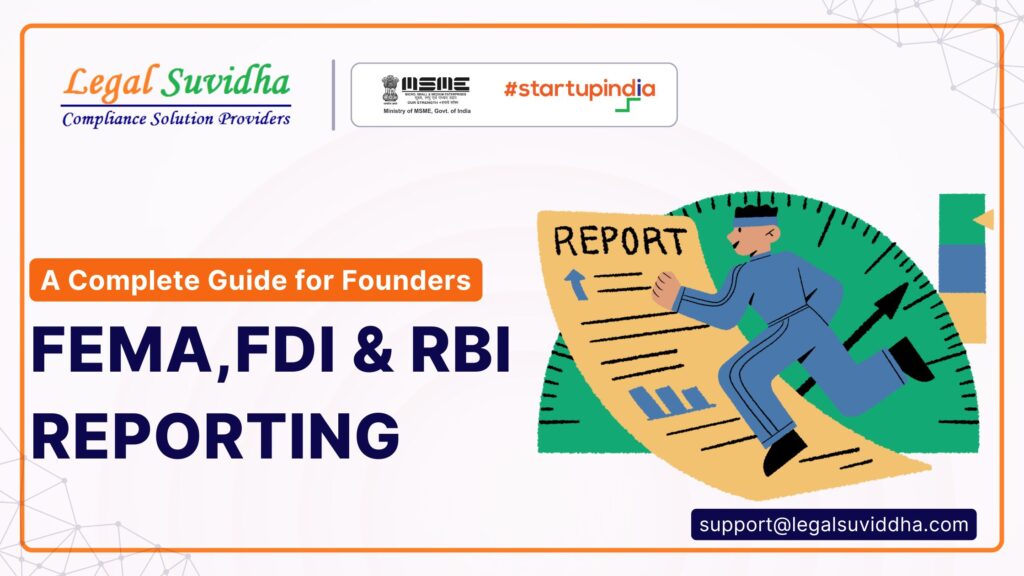FEMA, FDI & RBI Reporting: A Complete Guide for Founders
How one simple fund transfer triggered a ₹3.5 lakh fine.
Ravi, a young SaaS startup founder in Bengaluru, was thrilled. A friend from the US wired $50,000 into his startup account as a gesture of support. No contracts, no legal hassle—just pure encouragement. We’ll handle the paperwork later, Ravi thought.
Six months later, he was slapped with a notice from the Reserve Bank of India. The reason? Non-compliance with FEMA, FDI & RBI Reporting. The fine? ₹3.5 lakhs—and an official record of non-compliance.
What felt like a win turned into a financial nightmare.
The real reason startups mess up FEMA and FDI rules.
Ravi isn’t the only one. Every month, dozens of Indian founders unknowingly violate FEMA, FDI & RBI Reporting rules just by receiving foreign investments.
Here’s the problem: Startups raise funds in a digital-first world but operate in a regulatory system that still demands precise offline and online filings—with timelines as tight as 30 days.
And the consequences?
They’re not just monetary. They can halt future funding, ruin investor trust, and even trigger money laundering flags during audits.
What FEMA, FDI & RBI Reporting Really Involves
Founders are often unaware of how many touchpoints there are in FEMA, FDI & RBI Reporting:
📄 FIRC & KYC from the Bank (when funds arrive)
📝 Form ARF (to RBI within 30 days of receipt)
📤 Form FC-GPR (to RBI within 60 days of share allotment)
📊 FLA Annual Return (to be submitted by 15 July each year)
Each step is governed by FEMA regulations and RBI portals. Miss a deadline and you’re out of compliance—sometimes permanently.
Why late or missed filings can ruin your funding plans.
Most founders think, My CA will take care of it.
But here’s what really happens:
Your CA isn’t familiar with RBI’s FIRMS portal.
The valuation certificate is delayed.
The ARF form is missed.
The FC-GPR filing is incomplete or late.
All of these are punishable under FEMA.
And once due diligence begins—whether from VCs or foreign investors—your past slips come back. Many startups have lost funding or faced audits due to incorrect FEMA, FDI & RBI Reporting.
How a little systemization can solve big problems.
Here’s the truth:
You don’t need to be an expert in RBI rules. You just need the right checklist and the right partner.
✅ Maintain a calendar of investment receipts and share allotments.
✅ Get FIRC and KYC documents from your bank instantly.
✅ File ARF and FC-GPR well before the deadline.
✅ Submit your FLA return in July without fail.
The moment you systemize these steps, FEMA, FDI & RBI Reporting stops being scary.
The step-by-step plan we use to keep 500+ startups compliant.
At Legal Suvidha, we’ve helped over 500 startups stay ahead of RBI deadlines and FEMA compliance without breaking a sweat.
We offer:
✅ Expert handling of RBI FIRMS portal
✅ Seamless FC-GPR and ARF filing
✅ Certified Valuation Reports
✅ Complete FLA Return filing
✅ Legal Opinion for FEMA queries
Whether it’s a $10,000 angel round or a $1M VC investment, our team ensures your startup is never at risk due to poor FEMA, FDI & RBI Reporting.
And the best part? You stay focused on growth, not government portals.
Take control now or leave it to chance later.
You’ve made it this far—now you’ve got two options.
Option 1: Do Nothing
Hope your CA figures it out. Hope the RBI doesn’t send a notice. Hope investors don’t dig too deep.
But hope isn’t a strategy.
Option 2: Partner with Legal Suvidha
Let us take care of every FEMA, FDI & RBI Reporting requirement while you focus on building.
Connect with our Domain Expert or reach out via WhatsApp for instant help.
📱 Phone: 8130645164
📧 Email: [email protected]
🌐 Website: www.legalsuvidha.com
Angel Tax in 2025: How to Legally Save Your Startup from Scrutiny
How to Choose Between LLP, Pvt Ltd & OPC for Your Startup
How to Pitch to Angels in India: Structuring, Deck, and Terms
Setting Up a Virtual CFO + Compliance Stack for Startups










